In 1982, Ian Stanley’s vision for CCCC included two key elements: stewardship and pension support for international missionaries upon their retirement. Soon after CCCC was established and its name chosen, a committee set about to capture the organizational mandate. Here is what the committee wrote:
It was agreed that the most important function of the CCCC especially in its initial stages, will be the preparation, publication and dissemination of a bulletin to be produced on a periodic basis not less than four times in a year and that in addition news flashes of significant developments as relating to charitable organizations will be sent out as appropriate.
An editorial committee was established with the mandate to:
- Advise on current tax and legislative change as it occurs.
- Render articles of information, opinion and advice on all relevant aspects.
This reveals some of the thinking that brought CCCC into existence and explains the priorities in programs and services. You can see the thread of this mandate weaving through CCCC programs and services to this day.
Bulletin
Below, you can see the evolution of the CCCC Bulletin over the years.
The first bulletin was published as a newsletter in May 1973 under the name CCCC Educator. This introductory issue focused primarily on planned giving.
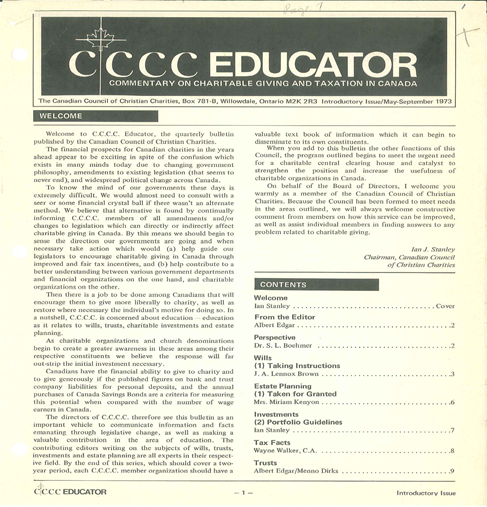
In 1982, the CCCC Educator was renamed CCCC News. In this early issue of the CCCC News, you can see that accountability is the top line item, followed by the Federal Budget, and information about communication… at that time, through snail mail via Canada Post. In some ways, things don’t change! We continue to report on the Federal Budget and accountability and transparency remain core CCCC priorities. We don’t spend too much time talking about paper mail anymore, but we do still provide lots of communication-related resources!
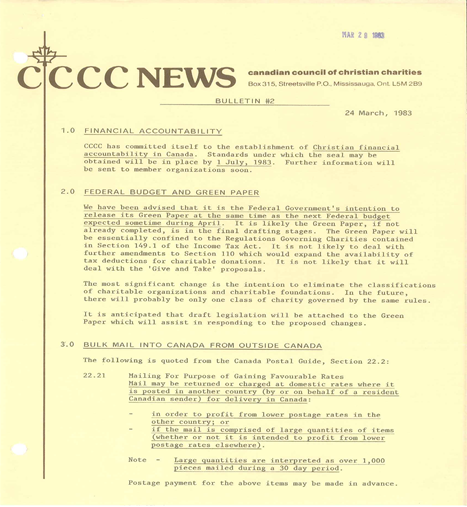
The current name for the publication, which has been used since 1985, is the CCCC Bulletin.
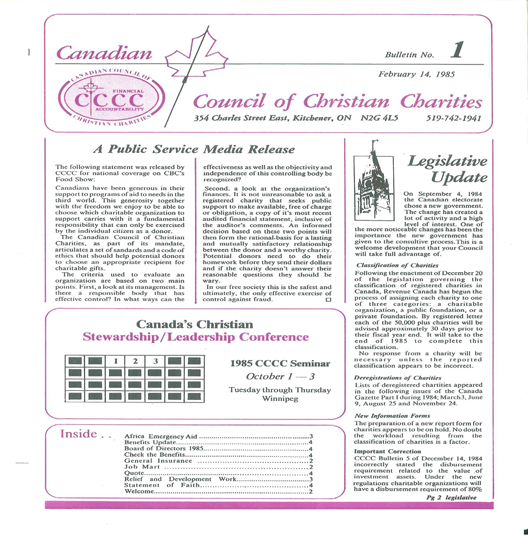
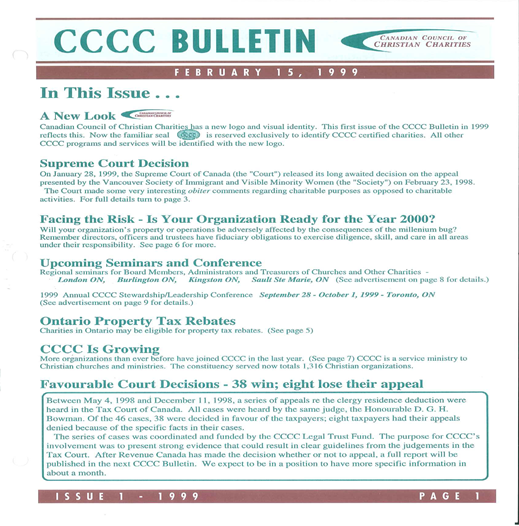
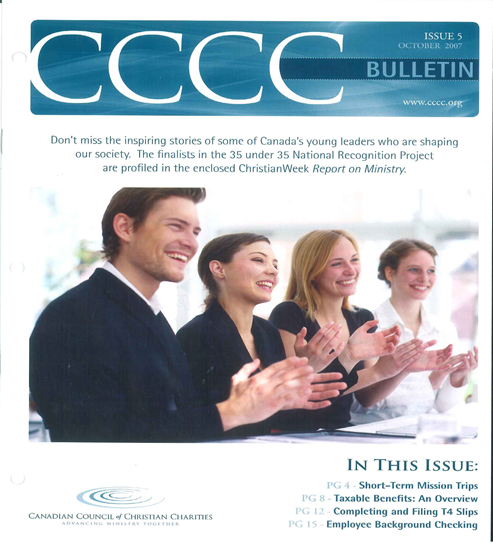

The CCCC Bulletin was available online in a flip-book format starting in 2011 and our current, fully digital edition began in March 2022.

Conferences & Webinars
In the fall of 1973, the First Annual Stewardship Seminar was convened in Calgary, Alberta. Total attendance was 76 individuals representing 43 ministries or churches. It was a blessing to gather together, build community, and learn from one another! This conference continued as an annual event until 2016.
In May 1975, the first of what would become the regional seminars was held at the Banfield Memorial Missionary Church in Willowdale, Ontario. The first regional seminar for church treasurers was held in 1981, and in 1985, regional seminars became part of the regular program of CCCC. These seminars were held all across Canada and covered a wide variety of topics.
CCCC recorded its first webinar in 2008 when it converted the regional seminar “Help, I’m a New Treasurer!” into a five-part webinar series.
In 2015-2016, the Regional Seminars were replaced by webinars and by CCCC staff participating in association and denominational conventions. We’re thankful for the early transition to webinars—it helped position CCCC well to serve and connect with members during pandemic restrictions in 2020.
Group Benefits & Pension
In 1977, the employee benefit insurance plan was launched with five employers becoming participating employers in the group. As of today, the group benefit plan has over 500 employers with more than 2,400 individuals on the plan!
By 1982, CCCC had enough members to establish a multi-employer registered pension plan in addition to the group benefit plan. Ken Dick, CCCC Board Chair and World Vision Canada executive, completed Ian Stanley’s founding vision for CCCC by implementing the pension plan.
The launch of both the benefit and pension plans was made possible by World Vision Canada, which transferred ownership of its existing employee benefits and pension plans to CCCC. The Baptist General Conference also merged its pension plan into the new CCCC pension plan right at the beginning. This meant both plans became multi-employer plans, giving CCCC member ministries the opportunity to offer benefits to their employees. The group benefit plan was also enhanced that year with the addition of the Overseas Missionary Medicare Plan.
World Vision now has its own plan, but CCCC will always be extremely grateful for their generosity and shared purpose in establishing a multi-employer pension plan to serve ministries small and large.
CCCC’s pension plan is thriving today with more than 100 employers participating (including some denominational offices) and over 1,400 individual members.
Community Trust Fund
The CCCC Community Trust Fund was established in 1994. Since its inception, the Community Trust Fund has provided two main services to benefit our members:
Brokerage facilitation services
Donors who want to give gifts of securities to their favourite CCCC member charities can do this through the CTF. Many charities do not have brokerage accounts because of the complexity and costs involved. The CTF allows CCCC to facilitate those donations. The charity benefits by receiving this type of donation through CCCC, and the donor benefits from the advantageous tax relief associated with these in-kind gifts.
Donor Advised Funds (DAFs)
Donors can set up DAFs through the Community Trust Fund—this allows gifts made in one year to be distributed over a period of time to Canadian registered charities suggested by the donors.
During the past 20 years, the CCCC Community Trust Fund has distributed nearly $16 million in facilitated immediate gifts and more than $7 million in DAF account distributions, with $927,000 currently held for future distribution.
Accreditation
For nearly 40 years, CCCC has offered an Accreditation (formerly Certification and Seal of Accountability) Program to its members. Back in 1982, CCCC decided to launch a program modelled after the Evangelical Council for Financial Accountability (ECFA) in the United States. Strong encouragement and generous sharing of time and expertise by ECFA was a significant help in establishing CCCC’s program in Canada.
CCCC member organizations were sent application forms in the fall of 1983. The program formally began on March 1, 1984, with 43 Accredited Charter Members. At that time, the total CCCC constituency consisted of 43 Accredited and 61 Affiliate Members.
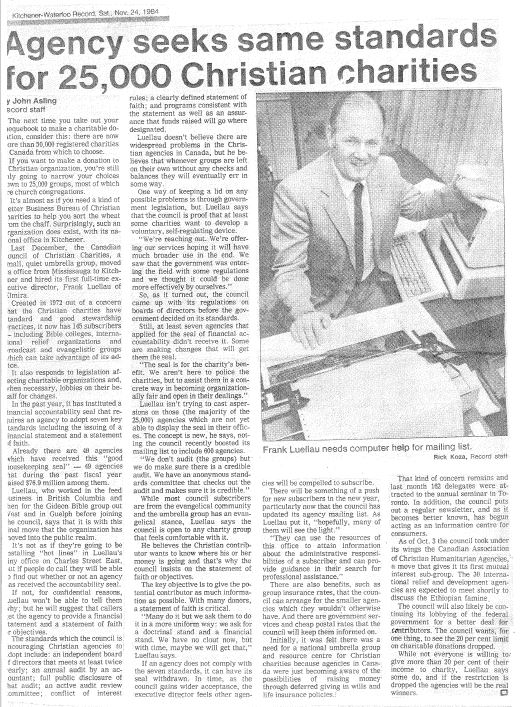
The two-tier membership was designed to make a clear distinction between Accredited and Affiliate Members. Accredited Members were able to display the “CCCC Seal of Accountability” to demonstrate that those charities had been carefully assessed by CCCC’s rigorous accreditation process and found to be in compliance with CCCC’s Standards. That included undergoing on-site field reviews by CCCC, an element that was added to the program in 1995.
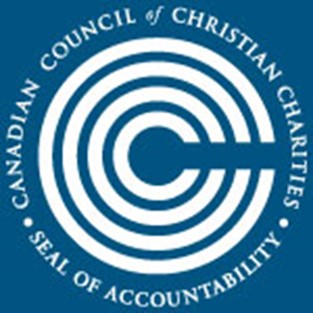
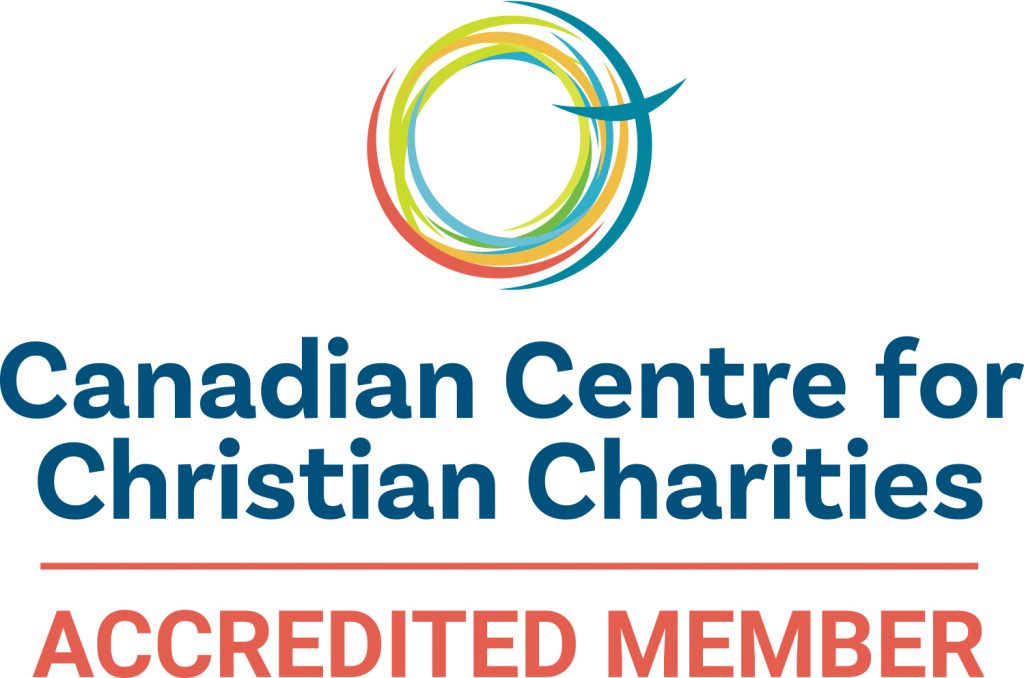
CCCC’s Standards are regularly reviewed and, when appropriate, modified; however, they remain largely unchanged. The first review, which lasted several years and involved extensive consultation, began in 1989, followed by reviews in 1996, 2005, 2017, and 2021.
The Standards encompass Christian ministry, diligent governance, ethical fundraising, financial oversight and transparency, and organizational integrity.
Travel
In 1985, CCCC was approached to take over the administration of a group purchasing program operating under the name Agape Travel. The initial expression of interest proved to be far greater than the realized enrollment in this program. The Agape Travel service to members was therefore terminated on March 31, 1987.
You might be wondering … Why include a now-defunct program that only lasted two years? CCCC knows that not every initiative becomes a resounding success. Sometimes even when we plan, pray, and prepare a program truly believing it is the path to follow it doesn’t work out. And that’s ok! There is great value in learning from these experiences and knowing that we are not alone in the ups and downs of charitable work.
Charities Handbook
In 1987, CCCC published its first book, the Charities Handbook. The book was written by Ron Knechtel and was an expansion of the Guide for Church Treasurers, which he had written for the church treasurers seminars. Since Ron was a partner with Clarkson Gordon at the time, CCCC entered into an agreement with Clarkson Gordon to license Ron’s content. Ron joined the CCCC staff in 1992.
Here’s a visual evolution of the Charities Handbook:
The precursor to the Charities Handbook
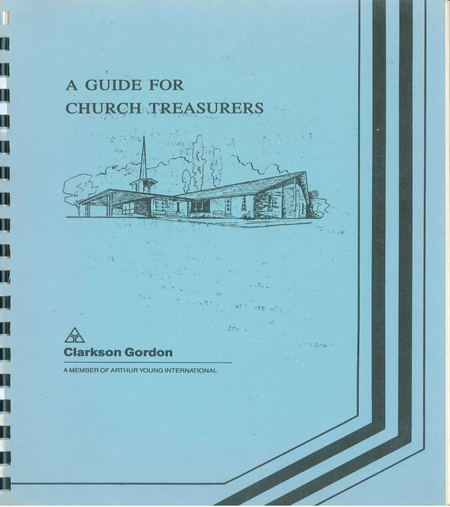
1989 (Note: This French version was made possible by a federal government grant)
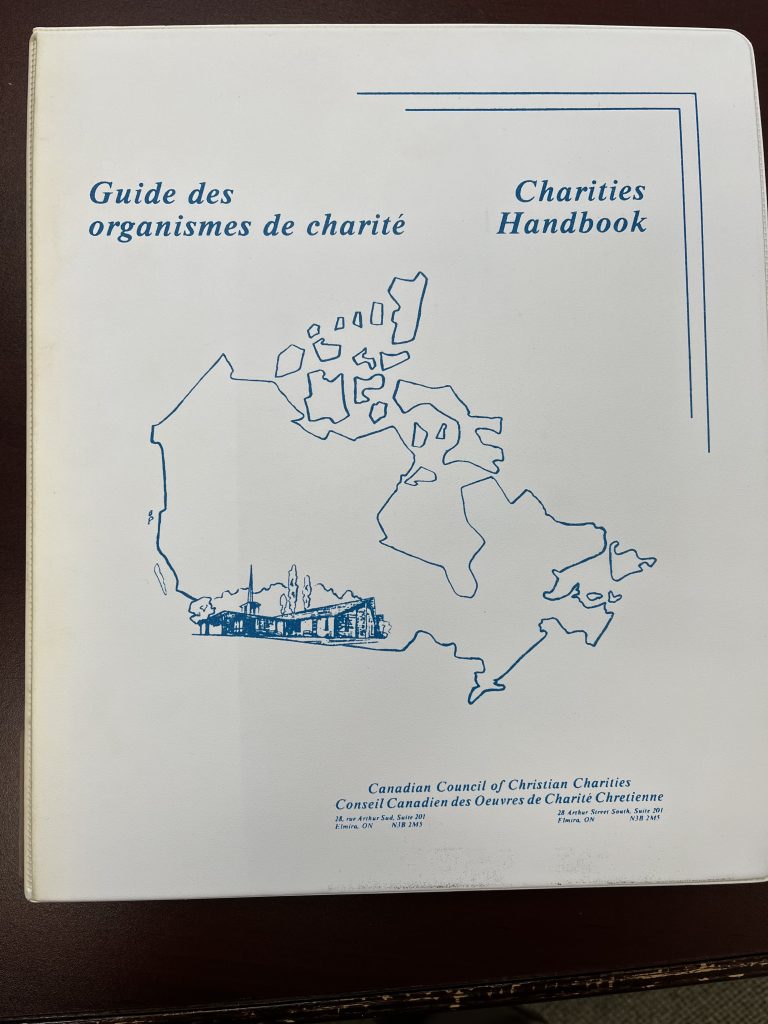
1999
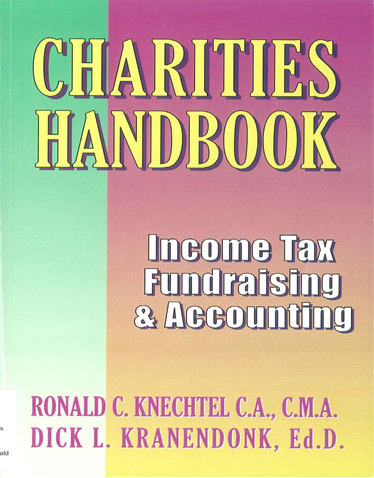
2006
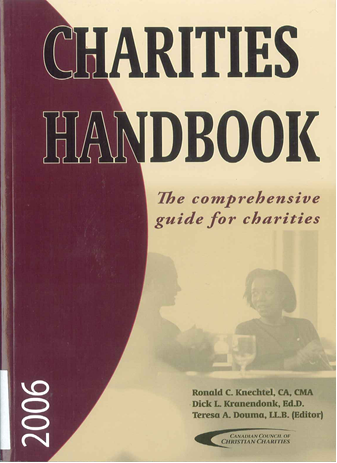
2008
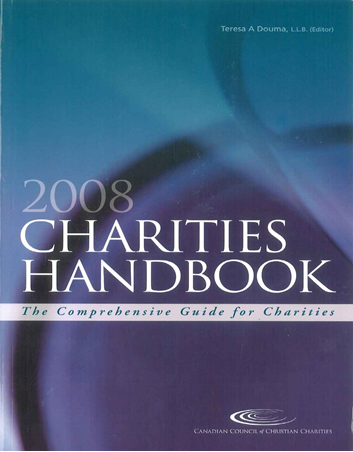
2012
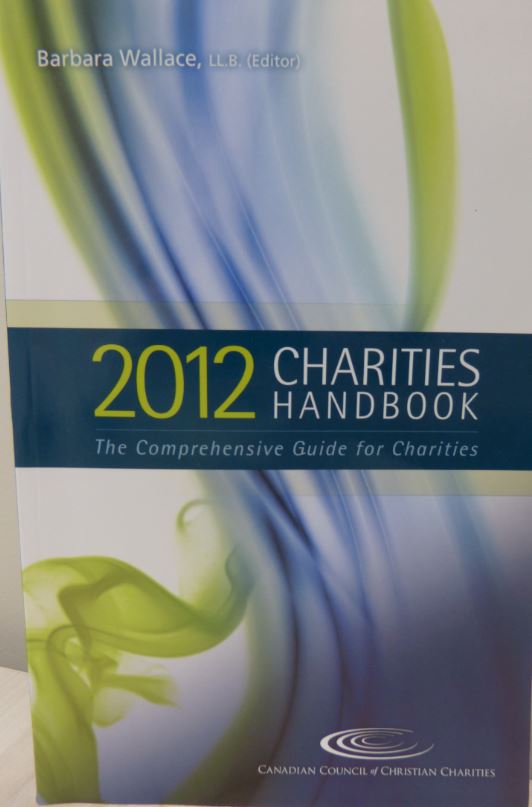
2014
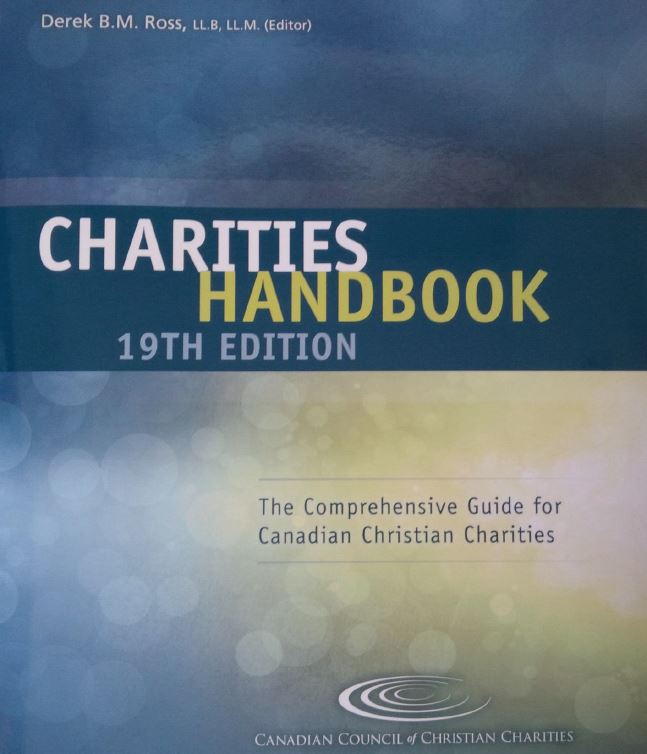
2016
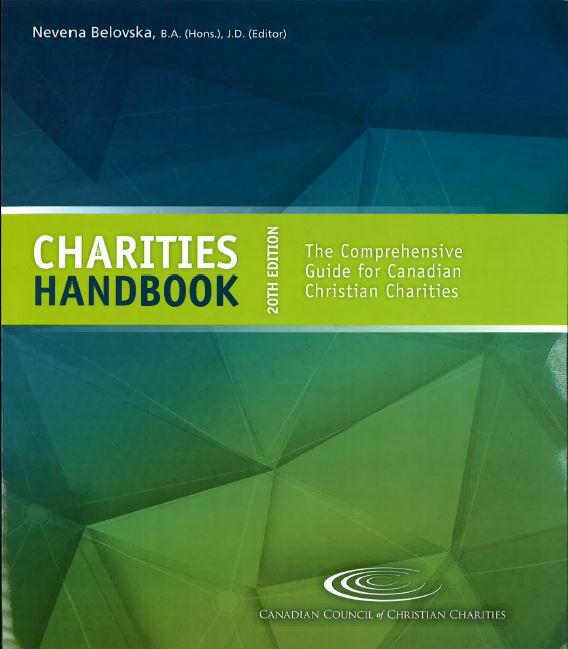
The Charities Handbook has been a core CCCC publication since its first publication. Now all of its content is available in digital (and searchable!) form through the CCCC Knowledge Base. It is continually updated to reflect changing rules, new topics, and your feedback!
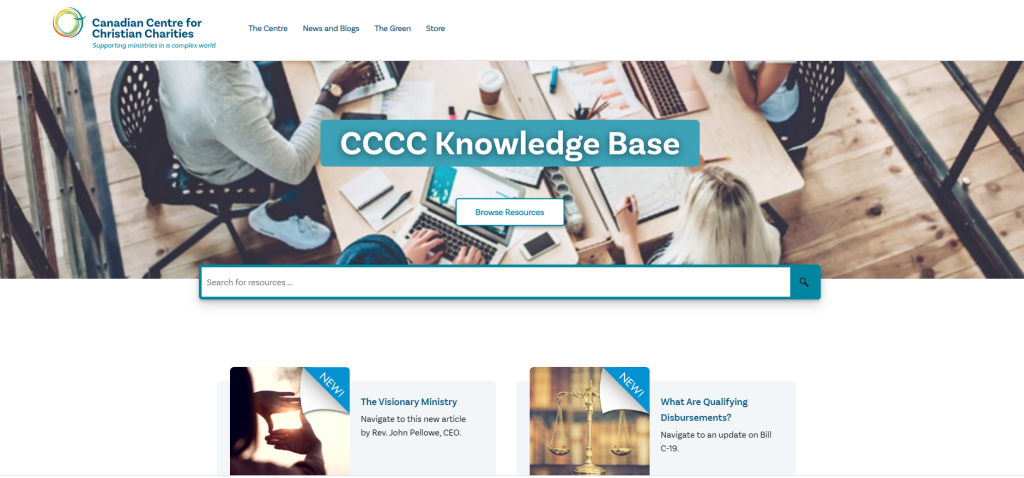
The Green
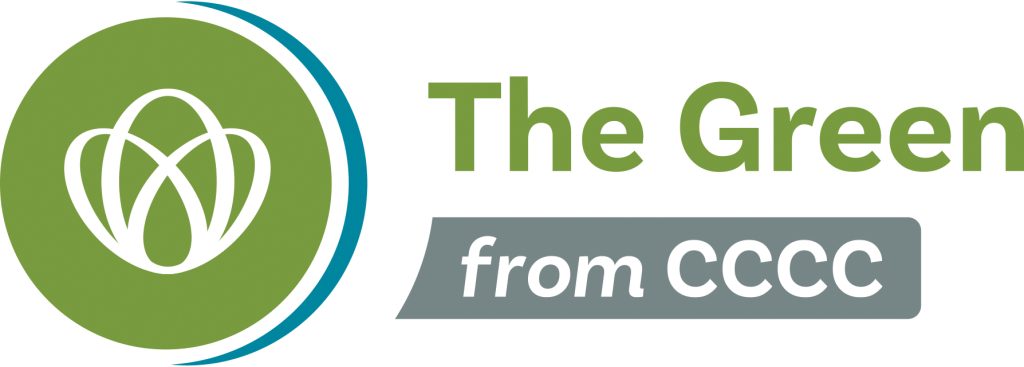
Launched in the onset of COVID-19-related closures, lockdowns, and uncertainty, The Green is an online community for CCCC members to share and learn. It brings ministry team members together for broad-ranging online collaboration, communication, and growth. With thousands of users and posts, you are sure to find a topic or a conversation that is of interest to you!
HR Programs
Recognizing a common need after receiving many calls from members regarding what to pay their employees, the CCCC Compensation Survey went live in May 2011. Unlike other compensation surveys that collect data and publish an annual report, this one is a “living document”. Every time a member joins the survey and shares their information, it updates the survey, and all members have access to the latest results. From the start, the survey has gathered input from members across Canada and has helped shape the compensation landscape for Christian charities. It exists to help ministries be good stewards of their people.
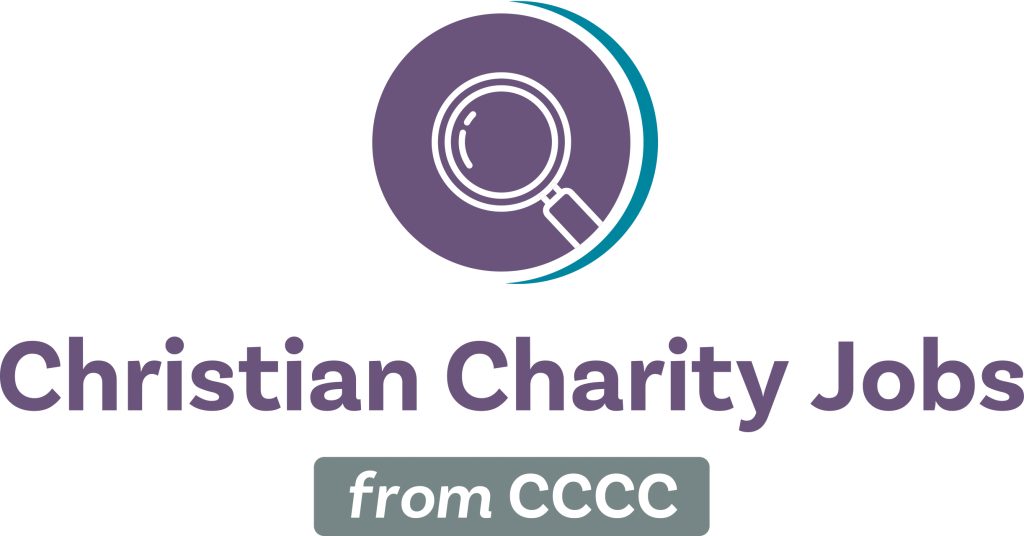
Christian Charity Jobs, the CCCC job board, was launched in November 2017. Since that time there has been steady growth, and CCCC is happy to provide a space for Christian ministries to find the right candidates that meet their unique needs. In a society where churches are at risk of negative attention and challenges, we have created a place where everyone involved in the recruitment process feels safe and welcome.
The HR Consulting program is where CCCC comes alongside charities to help them navigate complex human resources situations that they do not feel able to handle themselves. This program saw a slow start when it was first introduced in 2015 and didn’t really take off until late 2020. Now, it is most often used to help members create and edit policies that shape how they work and take care of the people that serve them.
More to Come!
Be sure to read the update “What’s Next for CCCC Members” on our 50th Anniversary page for a sneak peek at what’s coming!


